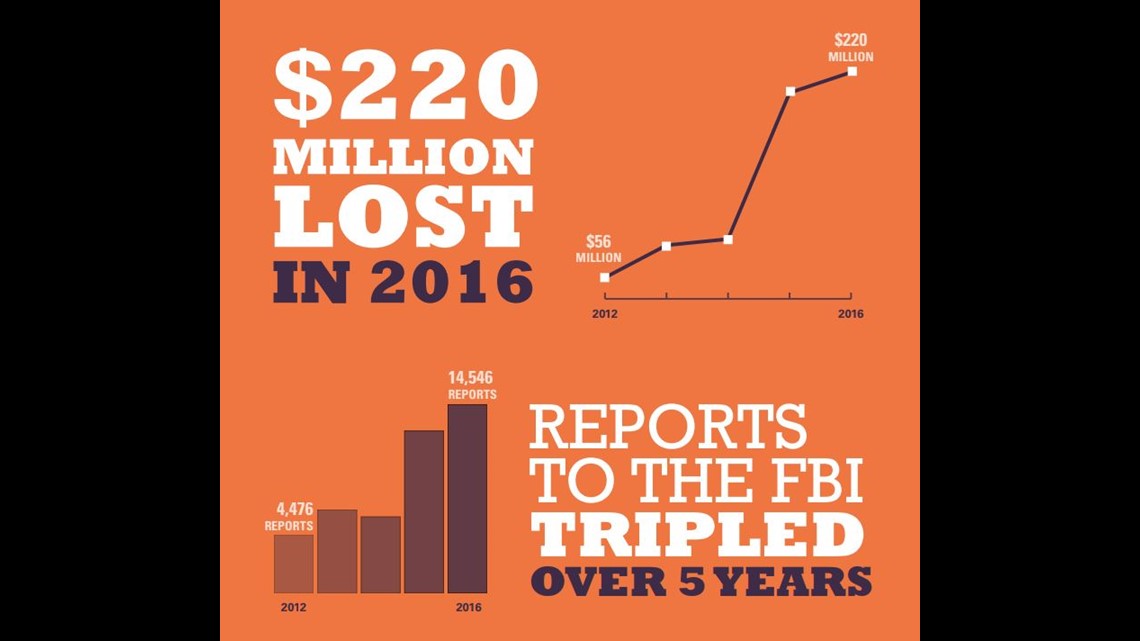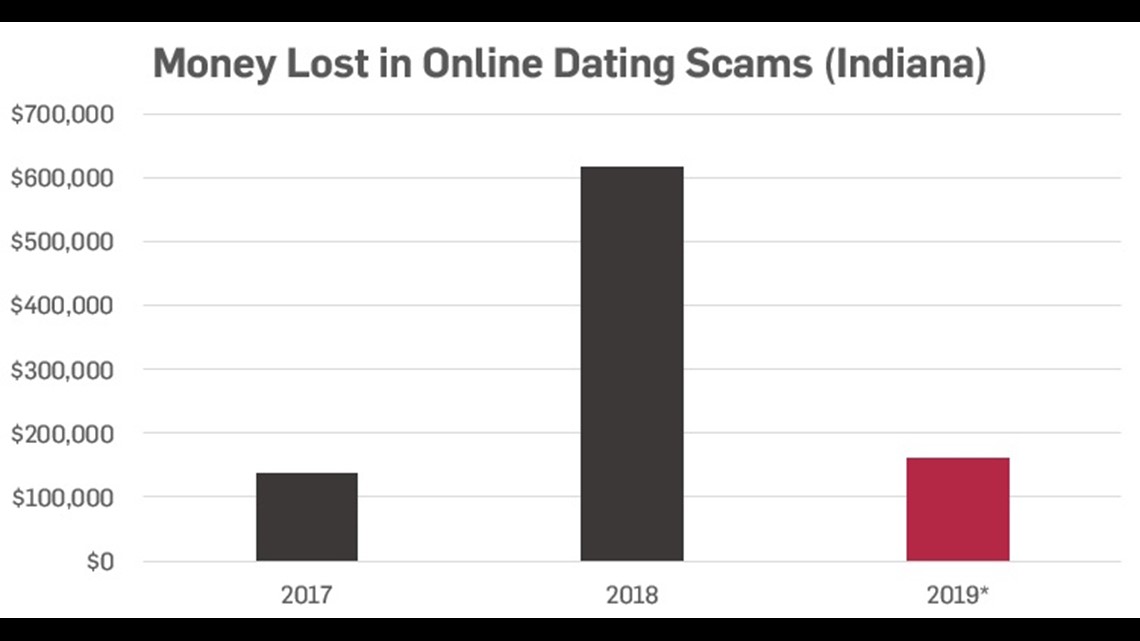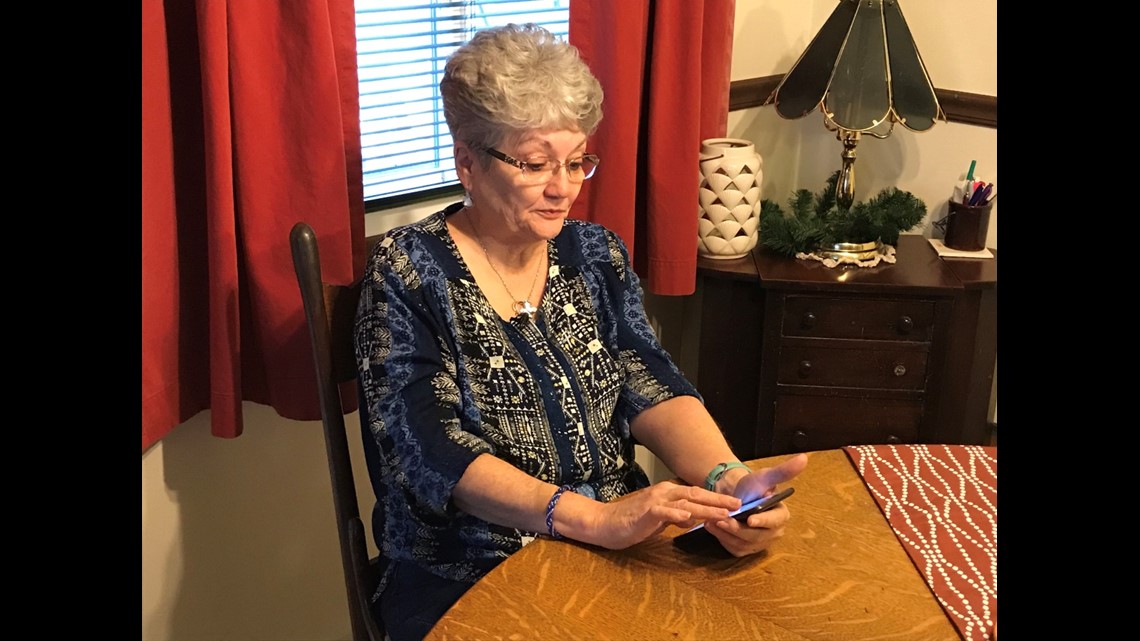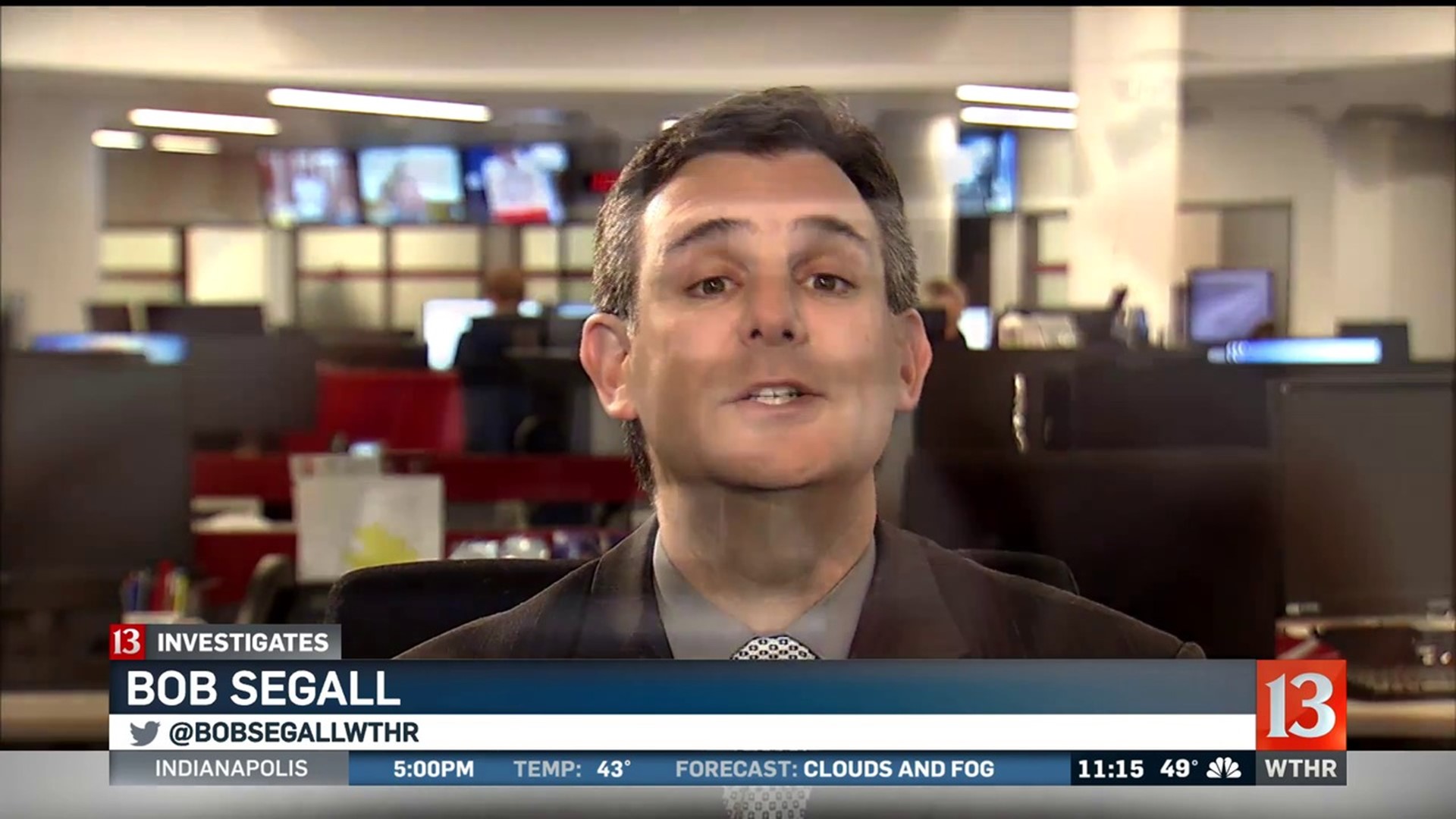INDIANAPOLIS (WTHR) — As the cell phone rang and Sharon Osborn looked at the caller ID, her heart began to race. Osborn bit her lip and stared at the phone on her dining room table, trying to decide what to do, what to say.
"Hi, Richard," she began, hands trembling . "I don't know what to say to you. I feel like you've lied to me."
The 70-year-old widow suspected the man she was talking to — the man who spent the past two months romancing her on the phone — is a conman.
13 Investigates helped confirm Osborn's suspicions were correct before she sent him tens of thousands of dollars in cash and electronics that he requested.
Like most scam artists who use online dating sites, the man who attempted to prey on Osborn left behind unmistakable clues to warn potential victims of his scheme. Those clues can help prevent you from falling victim to an increasingly popular scam that has devastated dozens of Hoosier families.
Millions lost


Last year in Indiana, a victim of an online dating scam lost $100,000 and another was duped out of $300,000, according to the state attorney general's office.
"If you do wire money to someone you meet online and if you do give them that money, there's a likelihood you'll never see that money again," said Betsy DeNardi, who oversees the Indiana Attorney General's Consumer Protection Office.
She told 13 Investigates that individuals who fall victim to online dating scams often do not come forward due to embarrassment, so accurately tracking the scope of the problem is difficult.
But statistics suggest the crime is on the rise. Last year, ten victims of online dating scams filed complaints with the attorney general's office, totaling $617,653 in financial losses — nearly four times higher than the year before. And in just the first few weeks of 2019, the AG's office has already received three complaints claiming more than $137,000 lost to online dating scams. Most victims are over the age of 55, and both men and women are targets.


"It's very hard to get the money back because, many times, the people behind this are not located in the United States, so if they're not in the country in the first place, we have no jurisdiction."
The FBI says consumers were duped out of more than $200 million in 2016 because of online dating scams.
Osborn did not send money to the man she courted online. Instead, she contacting 13 Investigates to verify if her growing suspicions about his true motivations were accurate. She was nonetheless the victim of an cruel, abusive dating scheme that impacted her emotionally. Osborn is sharing her story — and the lessons she learned — to help others avoid a similar experience.
"Crazy about you"


Sharon Osborn was married nearly 50 years. Her husband, George, died in 2015 just a few weeks before their golden anniversary.
Four years later, Osborn is lonely. She began exploring online dating sites, hoping they would help her find companionship.
"Just looking for a casual relationship, somebody to go out and dine with, talk to, have a friend," she explained.
That's when Sharon met Richard William on OurTime.com, an online dating site for adults age 50 and older. William claimed to be a successful businessman from the south. He said he was 70 years old and 6-feet tall with brown eyes, a college degree, a house in Louisiana, and his own business. The engineer said he had lost his longtime wife to brain cancer four years earlier. His online photos showed a happy, handsome, white-haired man who appeared to be traveling the world.
"I thought he had a wonderful smile. He was in Louisiana and I didn't expect him to respond, but he did," Sharon recalled.


William soon asked Osborn to share her personal contact information so they could communicate away from the dating site, claiming "I want to have you all to myself." Over the next two months, he then sent her hundreds of e-mails and text messages.
"I know I was created for you. It has not been but a short time of getting to know one another and I am totally crazy about you," he texted in November. "I sure never expected to neither meet nor find someone as amazing as you. Here I am, heart and soul, confessing to the whole world how I feel about you. I know, very soon I will be able to tell you directly while looking into your eyes."
Osborn was moved by the romantic words that flooded her inbox and cell phone several times each day.
"Nobody ever said those things to me before," she said. "I was feeling lonely and he was helping my self esteem, so I began to have feelings [for him] and he expressed he did, too."
Osborn was hoping she and William could meet, but instead her new friend said he had to leave the country — for just a few weeks — to do some work in Europe. Once there, he needed help. William asked Sharon to quickly send him two computers because his were badly damaged by a power surge, and he sent a text outlining the exact specifications of the pricey Apple Mac Book Pro computers he wanted from Best Buy.
"Once you buy them, I will send you the address. You will then go to the closest FedEx office and ship it to me," he wrote.
Osborn grew suspicious, and that's when she contacted WTHR. "I think God gives us little red flags," she said. With Richard William, there were lots of red flags — beginning with his photo.
Signs of a con artist


A quick internet search by 13 Investigates revealed the same man in the pictures sent by Osborn's suitor appears on many internet dating sites with dozens of different names, addresses and hometowns. The handsome gentleman appears as a 51-year-old from Arkansas, a 60-year-old from Tennessee, and a 22-year-old from Russia.
While the identity of the white-haired man who appears in the photographs is unclear, 13 Investigates could not find any information linking the photos to an actual person by the name of Richard William. It is a common practice of scam artists to troll the internet, stealing attractive photos of other people to assume a false identity and prey on their victims.
"I never suspected something like this on the internet," said Osborn, who paid a member ship fee to join the online dating site where she found the man posing as Richard William.
Sharon and 13 Investigates spotted many other red flags too.
- The company William said he founded does not exist as a registered business in any state.
- The home addresses he provided in Baton Rouge and Beverly Hills do not exist either. (The streets are real, but the street numbers are not.)
- The self-proclaimed company CEO who supposedly graduated with honors from a prestigious college used improper grammar, writing sentences such as "I believe communication is the best way to have two people leaving peacefully... I am looking for a friends and we'll see. Any relationship must has two important ingredients: The first one, is the discovery of what make us similar. The second one, is respect of what make us different."
- When William called Osborn's cell phone, he did not sound like a 70-year-old from Louisiana.
"I would have guessed him to be Middle Eastern, and he sounded like he was in his 30s," Osborn said. WTHR confirmed that analysis just moments later in Osborn's living room, when the scammer unexpectedly called Osborn during her interview with 13 Investigates.
When the widow questioned the caller's truthfulness and asked why his photos appeared on multiple dating sites under many different names, he became defensive and lashed out at Osborn for not trust him — another warning sign of a con job.
The so-called millionaire later claimed he had no access to his $14 million in savings while overseas, and he pleaded with Osborn to wire him $18,000 so he could pay a debt and "come home" to see her. He claimed there was a terrible explosion in Turkey that killed men working for him, and that if he did not get the money to pay the widows of the victims, Turkish authorities would arrest him and not allow him to come home to see her.
Osborn didn't buy the story. (And WTHR could find no foreign media reports to support news of the massive explosion.) Eventually, she handed the phone over to WTHR to notify the conman his conversation was being recorded and that we were on to his scam.
"Why in the world should she trust that you are a 70-year-old man from Louisiana when nothing that you say adds up?" asked WTHR.
"Keep your suggestions and your opinions to yourself, and I don't want to answer you. You give up the phone," he replied.


Not knowing who he was communicating with, he later e-mailed and texted WTHR detailed instructions on where to send the $18,000 he was requesting from Osborn. When he did not receive the money, he stopped calling, texting and e-mailing Osborn.
"It's just another con job — prey on the person that's lonely — and I'm sure not the only one and I won't be the last," Osborn said after she hung up the phone. "Other women need to know before they fall into the same trap."
More warning signs of an online dating scam
Osborn is now reluctant to visit online dating sites. Following her experience, WTHR compiled this list of red flags that every consumer should look for when looking to meet someone online. They are classic warning signs of online dating scams:
- PICTURE PROBLEMS. Is the person's photo original? Use an image search tool like Google Images and/or Yandex to see if the same photo appears on many other websites, possible under different names. If it does appear in many places, it suggests the photo might be stolen and person may not be who they say they are. Want to make sure their still photos are legit? Ask your online sweetie to take a verification photo holding a sign with YOUR name.
- NO VIDEO. Challenge your online partner to communicate via FaceTime or Skype so you can actually see who you are talking to in real time. Then see what they say. If they make excuses for weeks about why they cannot chat with you via video, that could suggest they are trying to hide their real identity or are not the person in that photo. Richard claimed he had no technology to have a video chat, even though he also said he had $14 million in his bank account.
- WHAT DID YOU SAY? If the person you're dating online claims to be native to a certain region or country but has a very different dialect or accent, that is cause for concern. Richard claimed to be born in France and living in Louisiana, but he had a Middle Eastern accent.
- NOT QUITE RIGHT. Spelling and grammar that does not match claimed education level can suggest the person does not live where they claim. Richard even spelled his own last name in different ways, sometimes calling himself Richard William and other times Richard Williams.
- BON VOYAGE. A common tactic used by con artists is claiming they quickly need to leave the country. Many online scammers are overseas to begin with, and this provides a convenient explanation why they cannot meet you.
- NEED HELP NOW! Claims of legal trouble or other crises that require emergency funding should be met with skepticism. "Send money to get me out of jail" is a classic scam tactic for someone preying on your emotions. "Send money because I lost my wallet" and "Send money because I lost my passport and cannot get home" are other common warning signs of financial schemes to defraud you of money.
- HEAD OVER HEELS. Moving the relationship along very quickly should be a warning sign for online relationship. The faster a scam artist can proclaim his love and convince a victim to become emotionally invested, the sooner he can start asking for money. Real relationships usually take time.
- DOESN'T ADD UP. The more questions you ask, the more information you'll get to see if you can verify if your online Romeo is telling the truth. Where can I send you a letter? Where do you work and what is your job title? What parks and restaurants do you like to go to in your town? Those are easy questions that should elicit quick responses that you can then search online to see if the answers make sense. Sharon was able to determine Richard's home address and company did not exist. Yeah, that's a big red flag.
- EASILY OFFENDED. Scam artists are clever and will gaslight their potential victims, trying to make them feel guilty for asking tough questions. When Sharon asked Richard tough questions, he replied "Why don't you trust me?" and insisted their relationship would not work if it were not based on trust. There is a difference between trust and blind trust. Anyone who is offended by tough questions probably isn't someone you want to spend the rest of your life with.
- ALWAYS COMES DOWN TO MONEY. Online scammers are out for one thing: making money at any cost. So your finances and the size of your bank account is a big deal to them. If some of the initial conversations you have with an online prospect include questions about whether you own your own home, how much you earn, or how much you have in savings, that could be a sign they are fishing for information to determine if you are worth their time. "If they learn you have no money to send them, they'll usually end the relationship and quickly move onto another target," DeNardi said. Richard sent Sharon a long list of personal questions soon after they met online. That list included questions about her financial well being.
- JUST BETWEEN US. If you tell lots of people you are dating someone online who repeatedly asks you for money, someone is going to try to talk sense into you, right? Scammers know that, so they will frequently ask their victims not to tell others about their relationship. They will also try to get you to communicate via personal email and text, away from the online dating sites where they can continue to look for more potential victims. Richard discouraged Sharon from discussing their relationship with anyone else.
- I'LL PAY YOU BACK. No they won't. Conmen in foreign countries do not send refund checks to their victims.
- CASH, ELECTRONICS, GIFT CARDS. Scam artists want money and items of value — any items of value. Asking you to wire money should be the most serious warning sign of an online scam. But asking for computers and gift cards is also very popular because they have instant value. Good rule of thumb: do not EVER send money, send items of value, or provide personal information such as your banking information or Social Security number to someone you have only met online.
Investigators at Trustify have also assembled tips to help prevent you from becoming the victim of an online dating scam.
Match, the parent company of the online dating site where Osborn found William, sent WTHR the following statement:
"At Match, the safety and well-being of our community is a top priority, and we take the issue of fraud very seriously. These scams are rare, but that doesn't make them any less upsetting. Match has a dedicated team and sophisticated technology that patrols for fraud and reviews each and every member profile to block IP addresses from high alert countries, stolen credit card numbers and red flag language in profiles. But, the bottom line is that users should never ever send money to someone you haven't met in person, and report the individual who asks you to do so. Those two steps will stop almost every scam in its tracks and help protect the next potential victim."

